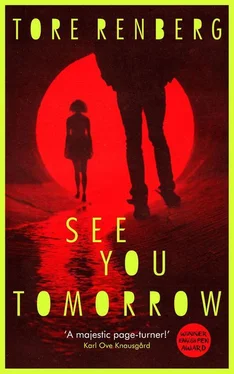They listened to Motörhead and Aerosmith, and later on that night Jan Inge put on a record from his dad’s old vinyl collection, Best of George Jones. They ordered a takeaway from Peder’s, deep-fried pork with curry sauce for Jan Inge, Chinese pepper chicken for Cecilie and Peder’s Burning Peppercorn Biff Pizza for Rudi, who, when Cecilie pointed out that they had had pizza yesterday, replied that just because he gets pussy the one day it doesn’t mean he’s tired of it the next. They changed into jogging pants and sweatshirts, ate, enjoyed the warm feeling of relaxation and refrained from talking too much, a fire engine drove past the house, and they went to bed, worn out, around midnight.
Saturday ambled along at the same leisurely pace, punctuated only by Jan Inge taking a spin in the car to deliver the haul to the island of Fogn and the barn of one Halldór Buonanotte Ljótsson from Isafjördur. The people out west just call him Buonanotte, because those Icelandic names are, as Rudi says, apaininthefuckinghole to pronounce. He did not come by the name through saying ‘good night’ every time he shot somebody, he was given it because for years he said ‘Buonanotte’ when he met people, due to Halldór thinking it meant good day. But no matter, when it comes to shifting loot, Halldór knows his stuff, can read people and make sales: Buonanotte on Fogn? He could sell tinned sweat. If you want your stuff dispersed far and wide on this side of the country, Halldór is the man to talk to, Buonanotte’s barn is where it happens. He sits in there like a Scrooge McDuck of the underworld, presiding over a sea of stolen goods, some space at the entrance for the tractor, but otherwise there’s little room for anything else; a vast horde of PCs, Macs, iPods, iPads, valuable car parts and everything a man could want, even a painting by Munch. Halldór came to Norway at the beginning of the millennium because he was weary of sheep, writers, fish and alcoholics, ‘and there’s nothing else in Iceland,’ as he put it, before adding, ‘yeah, and bloody Isbjörg, who I caught riding the neighbour one day, Ólafur from Sudureyri’. That Halldör has managed to stay under the radar since arriving in Norway is no inconsiderable feat; he’s never been inside, and remains unknown to the people in Lagårdsveien 6, they have no idea that the Icelandic ‘sheep farmer’ with an Alsatian named Geysir has a barn off the coast of Ryfylke filled with everything that has disappeared in the region since the turn of the century, and Fogn, well, what can you say?
An island with 300 inhabitants in the municipality of Finnøy, a tiny place with an athletics club, a youth club, a farmers’ club and a prayer club, not to mention an ever enthusiastic scouts troop — a transparent little society, in other words. Truth be told everyone out there knows what else Halldôr is up to, in addition to his greenhouses full of tomatoes and his hen house by the church, but sure, the islanders are proud of the few who have put up sticks out there, who have chosen to tough it out, who, like them, can pick up a pair of binoculars from their windowsill and glower over at the lights of Stavanger in the night-time, where the city slickers dwell thinking they are something. When the people of Fogn find such an enterprising man in their midst, a capable Icelander with his sleeves rolled up all year round, who never pisses in his toilet, but insists on relieving himself in the open air, who will turn up in his tractor ready to lend a hand to anyone on the island, who trains the boys’ football team, with a grin like a beaming equator around his head, a big, burly man who comes with Geysir by his side and good humour to boot, always has something sharp in his pocket and a good bit of salted sausage in his hand; when the people of Fogn are gifted such a fine man on the island, then they figure that what he gets up to and what he doesn’t get up to in his barn may be of concern to others, but it is no business of theirs. Because nobody has anything against Halldór, and it is obvious he must give these fellows who arrive on the ferry and drive up to him late at night strict instructions, because they may not be the best behaved individuals, but when they are on their way to Halldór they know how to conduct themselves, so what, then, is the problem?
Jan Inge had a pleasant trip. While he drove across Rennesøy, he pictured Cecilie’s pregnant stomach and Tong’s blasted face, and thought about change and what it actually is. He saw the landscape open up, drove on towards Fogn, where the terrain shifted to undulating hills, and when the Volvo neared its destination he could make out Halldór’s outline against the side of the barn; a dark giant. Jan Inge smiled at the familiar sight, got out, greeted the big Icelander, felt the wind on his bald patch, which seemed to be expanding by the day, and together they heaved the stuff inside.
Halldór looked it all over, nodded, mumbled and counted on his perpetually dirty fingers, before Jan Inge and the Icelander sat down for a chat in the barn, just inside the large doors, where he has a seating area consisting of an old green sofa, a pair of good leather armchairs from the seventies, and a table. Halldór served coffee with a splash of spirits while he chewed on a Viking sausage from Svindland’s of Flekkefjord, patted Geysir, and stroked his beard while listening with interest to Jan Inge’s account of his eventful Thursday. ‘ Það er nefnilega það, ’ he said, again and again, a sentence he utters so often that the whole of Fogn now uses it; when one of the boy scouts does something noteworthy, the scout leader can be heard to say það er nefnilega það, and when one of the pupils at the school distinguishes himself, the teacher will not be long in uttering það er nefnilega það, and the same goes for the prayer group, when one of the members informs the rest that the 400 kroner they sent to Somalia before Christmas has been used to build a church, then Hilde Østhus folds her arms across her sunken breasts and says: það er nefnilega það.
‘Yeah,’ Jan Inge says. ‘It was actually a time-honoured classic. Impossible to go wrong. But. Well. The human factor.’
‘ Það er nefnilega það, ’ Halldór nodded, and poured some more coffee and spirits.
‘But we’ll be okay. We have an alibi. We avoided leaving any trace behind. Pål has everything to lose if he gives us up. Our problems are inside of us. Murder. Living with murder.’
‘That can be hard.’
‘A scratch in the mental paintwork,’ Jan Inge said, ‘to make a comparison.’
‘Well well,’ Halldór said, ‘if anybody can manage, you lot can, Jan Inge.’
‘Good to hear you believe in us, Buonanotte.’
‘ Það er nefnilega það, ’ Halldór uttered once again as he dropped a piece of sausage for Geysir. ‘So Tong is daudur. Jahérna . In the graveyardium.’
‘Yes… there was that, of course.’
‘You have to bury him,’ Halldór said, raising one bushy eyebrow and sipping from his cup. ‘Even if he was a djöfulsins djöfull .’
‘ Djöfulsins? ’
‘An evil man.’
‘I understand.’
‘Yes, you do,’ Halldór said, rising to his feet. He pointed at Jan Inge. ‘Bald spot. I think you’re getting a bald spot.’
‘I think so too. But, Buonanotte?’
‘ Já, hvað ertu að spá, feiti hlúnkur? ’
‘Change. That’s what I’m thinking about. What do you think of change?’
‘ Jæja ,’ Halldór said, rubbing Geysir under the ear. ‘ Breytingar . I think it’s God’s gift to okkur dauðlegra .’
Halldór paid a few thousand kroner notes for the haul, asked Jan Inge to say hello to the others and tell them they were always welcome to the barn whether for business or a party, because he appreciated having such good colleagues and nobody should deny themselves a knees-up now and then, and before Jan Inge had rattled off over the hills and sailed round the corners from Eidsbrotet in the direction of the ferry, Halldór threw a stick which Geysir loped after and mumbled helvítis djöfull and það er nefnilega það, before telling him that he would spend his evening reminiscing about the only Korean he had ever known, a silent one with jet-black hair: ‘Because you know, Jan Inge, in Isafjördur we don’t have many immigrants from far-off places, but we have a music school and an amateur theatre group and for two months we don’t see the sun and it’s not uncommon for planes not to take off or land for days at a time, so change, well, us Icelanders are so used to it that we don’t know what it is.’
Читать дальше












